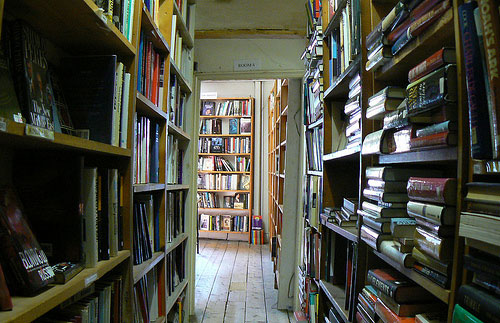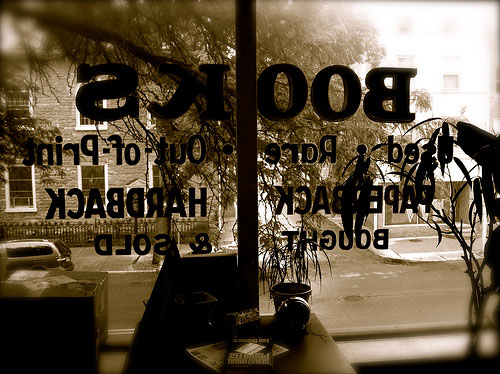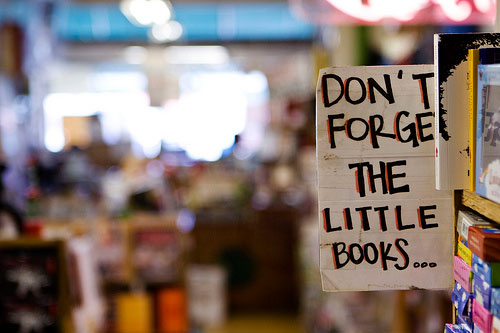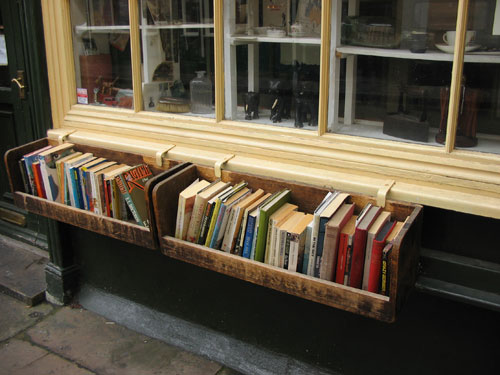Theme Essay by Wendy Glaas
The Call of the Open Bookstore
It’s not so bad that I’ve got piles of books dotting the floor. But now piles have sprouted on my nightstand, radiator covers, and coffee table as well.
Each book enticed me with its glossy cover and the new world inside; somehow, I never stopped to consider the space issue. Once I got them home, the really good ones tempted me to forsake sleep or put off chores. And I don’t want to think of how much I’ve spent on them over a lifetime.
I admit it: I’m a bookstore junkie.
I developed my addiction quite innocently. In the summer, my mind turns to road trips, the kind with little preconceived idea about where those roads may end. It was through one of these meanderings in the mid-1990s that I found the Montague Book Mill in Western Massachusetts, years before it was a destination spot.
Once I found it, I returned frequently. I liked the setting above the churning falls of the Sawmill River. I liked combing through the sometimes dusty, sometimes haphazard piles, unsure of what I’d come across. Since these were used books and thus a relative bargain, I could rationalize buying a number of them at a time. At one point, before the Great Basement Floods of 2005 claimed a few boxes, perhaps a quarter of my books came from the Book Mill alone.
Since I live in the bookshop-laden Boston/Cambridge area, it’s easy for me to get lazy about finding new browsing sites. But this year, after coming across Richard Wright’s blog piece about hitting four Vermont bookstores in one day—“One-Day-Bookstore-Tour in Vermont”—I was inspired. I set out, guerrilla-style, to explore as many stores as I could, culled from the New England Independent Booksellers Association website.
Throughout the course of one week, I visited eleven, from Massachusetts to Maine.
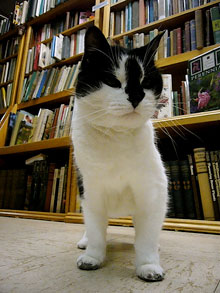 I imagined I’d find myself in cluttered, cozy places, with cats reclining on armchairs and pots of tea at the ready. I was a little disappointed not to encounter any resident dogs or cats. The beverage situation was a bit better. A Novel Café (Tewksbury, Massachusetts) had a variety of caffeine and sugar offerings and ample lounging space, and the Andover Bookstore (Andover, Massachusetts), which bills itself the second-oldest continually operating bookstore in America, greeted browsers with a large urn of complimentary coffee.
I imagined I’d find myself in cluttered, cozy places, with cats reclining on armchairs and pots of tea at the ready. I was a little disappointed not to encounter any resident dogs or cats. The beverage situation was a bit better. A Novel Café (Tewksbury, Massachusetts) had a variety of caffeine and sugar offerings and ample lounging space, and the Andover Bookstore (Andover, Massachusetts), which bills itself the second-oldest continually operating bookstore in America, greeted browsers with a large urn of complimentary coffee.
Several bookshops humbled me by their deceptive outward appearances. The Toadstool Bookshop (Milford, New Hampshire) and The Book Cellar (Nashua, New Hampshire) were located within a few miles of each other on Route 101, a commercial highway peppered with strip malls and at least one place to buy fireworks. I didn’t expect to find a great bookstore next to a Dollar Tree. But I did. Larry Portzline would have been proud.
Portzline, a college teacher from Pennsylvania, first popularized the term “bookstore tourism” in 2003. He describes the appeal in his self-published guide Bookstore Tourism: The Book Addict’s Guide to Planning and Promoting Bookstore Road Trips for Bibliophiles and Other Bookshop Junkies.
He notes that when he meets up with a new tour group, one of the first questions he asks is, “How many of you are completely addicted to books?” He goes on to say:
Almost every hand goes up, and people are looking around the bus and smiling. Then I ask, ‘How many of you have piles and piles of books on the floor at home because you ran out of shelf space a long time ago?’ And the same hands go right back up. And by this point, they’re laughing and looking around at all these people who were strangers just a few seconds before, and they realize that they’re among their own kind.”
I didn’t charter a busload of bookworms, but I definitely get the appeal of bookstore tourism. Bookstores provide a visual, tactile experience that you just can’t get from shopping online. I often walk into a bookstore without an agenda and go wherever my eye leads me, purchasing books on a whim.
In Kennebooks (Kennebunk, Maine), for instance, I picked up Maine writer Paul Doiron’s The Poacher’s Son. I liked reading bits of Maine lore I wouldn’t have otherwise known about, like a hunter’s use of deer urine to cover his scent in the woods. I wasn’t thrilled with the ending, but I enjoyed the strong sense of place conveyed by this book.
My visit to Kennebooks made me realize an additional thrill offered by brick-and-mortar bookstores: the unpredictable and usually unintentional juxtaposition of the books on the shelves. I loved seeing biographies of Ronald Reagan and Mark Twain side by side and finding, in a display aimed at gifts for the graduate, Glenn Beck’s The 7: Seven Wonders That Will Change Your Life next to Eleanor Roosevelt’s You Learn by Living.
I suspect that independent bookstores are proxies for the community, a form of literary profiling. Judging from Jabberwocky Bookshop’s large section on landscaping, I’d guess that people in Newburyport, Massachusetts, really love their gardens.
Used bookstores take profiling to another level: getting into the heads of the previous book owners or the mores of the time when a book was published. When I came across E. Werner’s She Fell in Love with Her Husband in The Book Bear (West Brookfield, Massachusetts), I laughed out loud over what I figured was an obvious prerequisite for marriage. But maybe that wasn’t the case in 1892, when people were motivated to marry for other reasons, such as financial security or social expectations.
And while it’s common to find Nancy Drew books in used bookstores, I’d never seen them printed in another language. The Book Bear had a handful of these in Swedish.
Regardless of all doomsayers, it’s these quirky finds that convince me the closing of a big chain like Borders is not a bellwether for bookstores in general. Bookshops are more than just a venue for buying books or glimpsing regional culture. There’s a definite social aspect to hanging out in one, unlike other public spots where it’s considered suspect for strangers to make eye contact and initiate conversation.
For an inveterate people watcher like myself, bookshops are great for observing human nature, an especially fun pastime if the store has a lounging area. Even if I’m not close enough to hear actual conversations, I can tell which customers are on a first date based on body language. I sometimes make up the tentative, getting-to-know-you dialogue between a couple (“What do you like to cook?” “I’m an only child too!”).
Bookstore owners are usually as friendly as their customers. Newburyport, Massachusetts, a town of less than 25,000 people, has not one but three bookstores. Most do more than sell hardbound or paperback books. They cater to e-readers as well and will track down out-of-print books on request.
In Portzline’s words, these people are my “own kind.” The nerdy kinship I feel is no less real than the connections made in Red Sox Nation.
When I enter yet another bookstore with its lovely, jumbled, quirky shelves, time stops—or at least slows down. For as long as I can, I’ll keep building my piles.
Additional Information
- Larry Portzline’s website
- New England Independent Booksellers Association (NEIBA)
- “One-Day-Bookstore-Tour in Vermont” from Richard Wright’s blog, On Saving the Rural New England Bookstore
- “The Joy of Cookbook Shopping: Why Bookstore Tourism Matters” by David Farley, AOL Travel, January 31, 2011
- “A World Tour of Bookstore Cafes” by Mark Vanhoenacker, Los Angeles Times, February 6, 2011
- “Written Off?” by Alex Beam, Boston Globe, May 31, 2011
- The Poacher’s Son byPaul Doiron(Minotaur Books, 2010)
- She Fell in Love with Her Husband by E. Werner (Rand McNally, 1892; reissued by General Books, 2009)
- Bookstore Tourism: The Book Addict’s Guide to Planning and Promoting Bookstore Road Trips for Bibliophiles and Other Bookshop Junkies by Larry Portzline (Bookshop Junkie Press, 2004)
Art Information
- "Books" © Kate Mereand; Creative Commons license
- "This is Dust Muffin" © Bonbon; Creative Commons license
- "Flower Box Bookshelf" © Lauren Baker; stock image
- "Room 4" © John Robinson; Creative Commons license
- "Don't Forget" © Green Kozi; Creative Commons license
 Wendy Glaas is an editorial assistant at Talking Writing.
Wendy Glaas is an editorial assistant at Talking Writing.
With grad school now in the rearview mirror, Wendy is tickled to be reading for pleasure again…and to be chipping away at her piles. In the absence of future Stieg Larsson books to look forward to, she’s discovered another middle-aged Swedish gumshoe: Henning Mankell’s Kurt Wallander.
She looks forward to reading Mankell’s Faceless Killers and finishing Elyssa East's Dogtown during an August trip to Vermont. Thunderstorms are predicted for nearly every day of her trip, so she’s bringing along Asne Seierstad's The Bookseller of Kabul, too. All three books are souvenirs of her bookstore jaunts.

